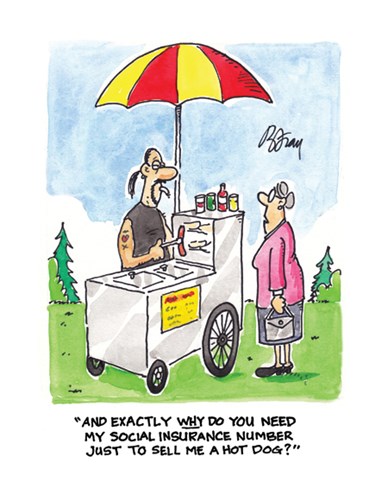Protecting your Social Insurance Number
Your Social Insurance Number (SIN) is a confidential number used for income reporting purposes. However, some organizations ask for the SIN for other reasons.
The SIN is important to privacy protection. It can open the door to your personal information and can put you at risk of fraud and identity theft.
On this page
- What privacy risks are related to the SIN?
- How can I protect my SIN?
- When do I have to provide my SIN?
- When don’t I have to provide my SIN?
- What should I do if I’m asked for my SIN?
- What obligations do businesses have under federal privacy law?
- My SIN may have been compromised, what should I do?
- How do I apply for a SIN?
What privacy risks are related to the SIN?
Your SIN can be used to steal your identity. Along with other personal information, someone may be able to use your SIN to:
- apply for a credit card or open a bank account,
- rent vehicles, equipment, or accommodation in your name, leaving you responsible for the bills.
How can I protect my SIN?
Key steps you can take to protect your SIN include:
- Storing your SIN card and other documents containing your SIN in a safe place. (Do not keep your SIN card in your wallet.)
- Shredding documents that contain your SIN. (Do not put them in the recycling bin.)
- Providing your SIN only when it’s legally required.
- Taking steps to protect your SIN if you believe it is being used fraudulently.
When do I have to provide my SIN?
There are a few federal government departments and programs specifically authorized to collect the SIN.
Some private-sector organizations must also collect the SIN for income reporting purposes.
Service Canada, the federal government department responsible for the administration of the SIN, has identified some of the most common uses of the SIN on its website.
Note for Quebec residents: Hydro Québec is required by provincial law to collect a SIN for opening new accounts.
When don’t I have to provide my SIN?
Some organizations ask for the SIN for reasons unrelated to income reporting purposes – often because it is a simple method of identification.
While this is not recommended, there is no law preventing private-sector organizations from asking for the SIN for other purposes such as identification.
In these cases, you are under no obligation to provide your SIN. Just because someone asks for your SIN, it doesn’t mean that you have to provide it.
On its website, Service Canada lists some examples of when you do not need to provide your SIN.
What should I do if I am asked for my SIN?
We recommend that you do not give the SIN to a private-sector organization unless there is a legal requirement to do so.
If you are asked for your SIN, here are some tips:
- Ask if you are required by law to provide it.
- Ask why the person needs it, how it will be used and to whom it will be given.
- If it is not required by law (and you are not satisfied with the explanation), tell the person you prefer not to use the SIN and offer other identification. Your SIN is not a piece of identification.
- If you can’t resolve your concern with front-line staff, ask for the contact information for the person in their organization who is responsible for privacy issues. This person is often called the privacy officer. Discuss your concerns with that person. They may be able to address your issue.
- If the organization refuses to give you the product or service unless you give your SIN, file a complaint with us.
Remember: You can’t be denied a product or service for refusing to provide your SIN when it’s not legally required.
What obligations do businesses have under federal privacy law?
We recommend that private-sector organizations not ask a customer for their SIN unless there is a legal requirement to do so.
While there is no law barring businesses from asking for the SIN where there is no legal requirement to do so, they do need to make people aware that collection of a SIN is optional and not a condition of service.
The Personal Information Protection and Electronic Documents Act (PIPEDA) sets out ground rules for how private sector organizations may handle personal information — including the SIN — in the course of commercial activities.
Under the law, organizations cannot require you to consent to the collection, use or disclosure of your personal information unless it is required for a specific and legitimate purpose.
This means that, unless an organization can demonstrate that your SIN is required by law, or that no alternative identifier would suffice to complete the transaction, you cannot be denied a product or service on the grounds of your refusal to provide your SIN.
My SIN may have been compromised, what should I do?
Service Canada has detailed advice for people who suspect their SIN is being used fraudulently on their website. You may also want to take a look at our page, Identity Theft and You.
How do I apply for a SIN? What should I do if I have lost my SIN?
The Service Canada website has answers to general questions about the SIN such as how to apply for a SIN, or replace a lost or stolen card.
Service Canada can be contacted online or by telephone at: 1 800 O-Canada (1-800-622-6232).
To visit one of their offices in person, see the online list of Service Canada offices.
Questions?
For more information about privacy issues related to your SIN, please contact us.
- Date modified:



